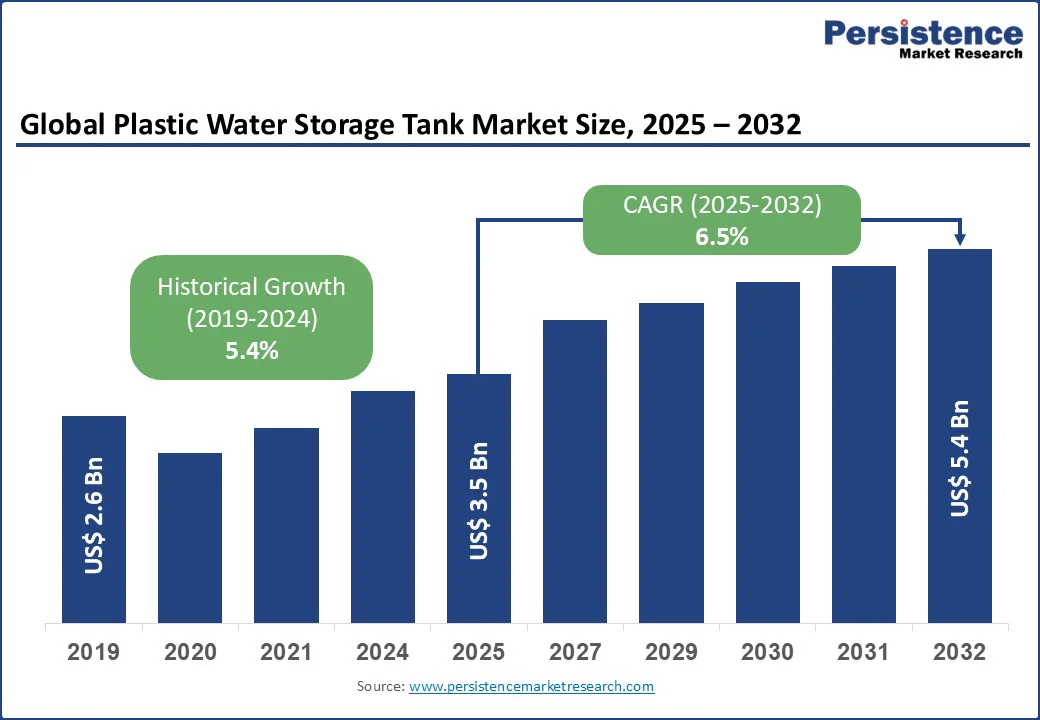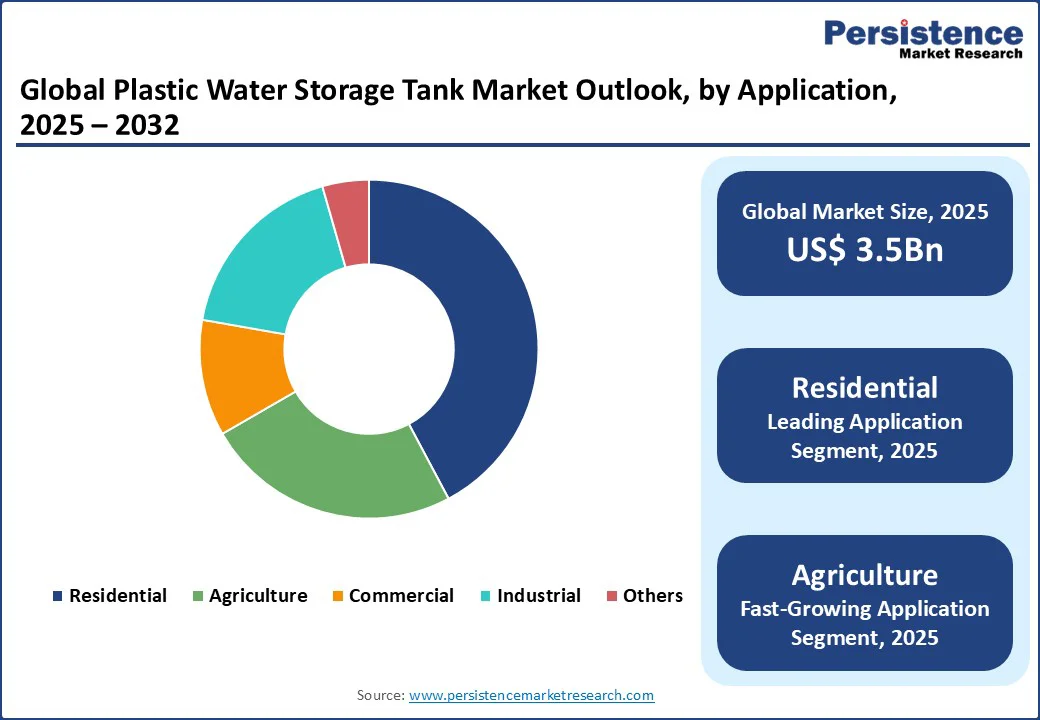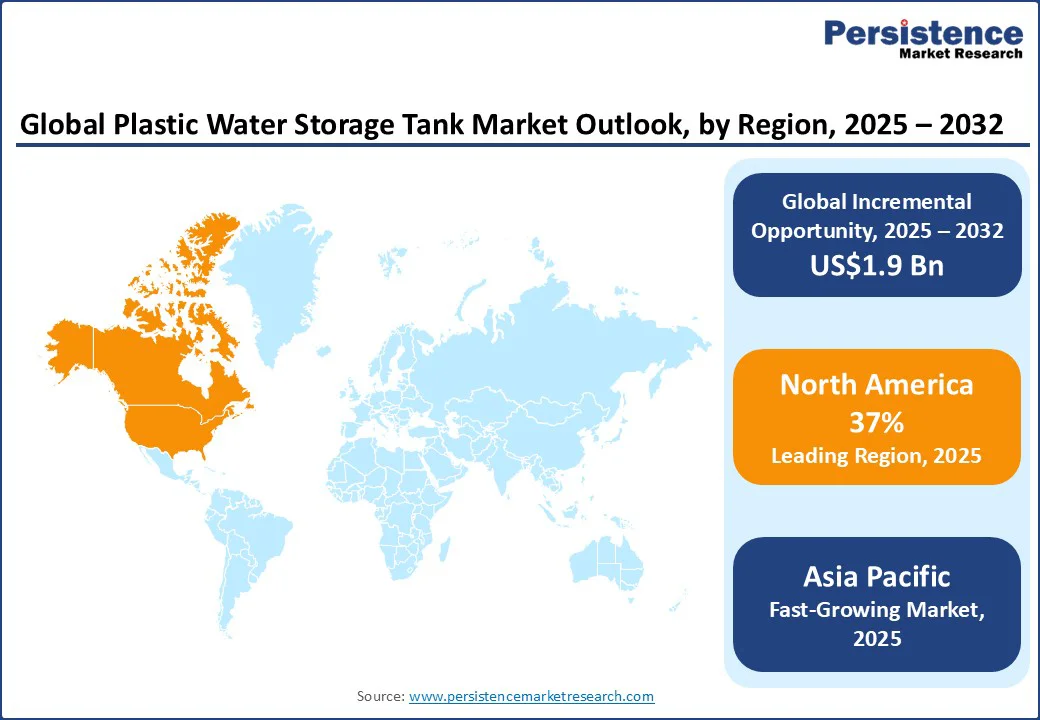ID: PMRREP12220| 180 Pages | 24 Sep 2025 | Format: PDF, Excel, PPT* | Industrial Automation

The global plastic water storage tank market size is likely to reach US$3.5 Bn in 2025 and is expected to reach US$5.4 Bn by 2032, registering a robust CAGR of 6.5% during the forecast period from 2025 to 2032. Industry has experienced significant growth, fueled by the increasing demand for reliable water storage solutions, advancements in plastic manufacturing technologies, and a global push toward water conservation and sustainable infrastructure.
Key Industry Highlights:

| Key Insights | Details |
|---|---|
| Plastic Water Storage Tank Market Size (2025E) | US$3.5 Bn |
| Market Value Forecast (2032F) | US$5.4 Bn |
| Projected Growth (CAGR 2025 to 2032) | 6.5% |
| Historical Market Growth (CAGR 2019 to 2024) | 5.4% |
The global surge in demand for water conservation is a primary driver of the plastic water storage tank market. According to UNICEF, half of the world's population could be living in areas facing water scarcity by as early as 2025, with some 700 million people potentially displaced by intense water shortages. This trend is alarming and intensified by rapid population growth and urbanization, with the global urban population facing water scarcity expected to nearly double in the coming decades.
In response, governments and organizations are investing heavily in water infrastructure, such as China’s long-term national plan that prioritizes conservation and large-scale projects, including widespread adoption of storage solutions such as plastic tanks to ensure reliable supply in both urban and rural areas.
In India, where the struggle with water scarcity is felt at a high scale in rural parts, initiatives aimed at providing safe drinking water to households are driving strong demand for affordable and durable plastic tanks for rainwater harvesting and storage.
The plastic water storage tank market faces considerable challenges driven by high upfront costs and the need for skilled expertise. Manufacturing and installing large-capacity tanks require advanced equipment and durable materials such as high-density polyethylene, making units expensive, particularly when customized.
Transportation further adds to the financial burden, as the bulky size of tanks significantly increases logistics expenses, especially in remote or hard-to-reach areas. These challenges are compounded by the necessity for proper site preparation and professional installation to ensure leak-proof performance and compliance with safety standards.
A shortage of trained technicians remains a pressing issue, with most expertise concentrated in developed regions, limiting scalability in emerging markets. In addition, the absence of standardized installation practices often leads to inconsistent performance, higher maintenance costs, and risk of system failure.
Regulatory requirements, such as environmental certifications for recycled plastics, further complicate adoption. Together, these barriers can deter smaller households and businesses, slowing market growth in cost-sensitive residential and agricultural sectors.
Technological advancements in sustainable plastic water storage tanks are creating substantial growth opportunities across both residential and industrial markets. The shift toward eco-friendly materials, including recycled plastics and bio-based polymers, supports environmental sustainability while reducing dependence on virgin resources.
These innovations are complemented by smart technologies, such as IoT-enabled sensors, which allow real-time monitoring of water levels, quality, and usage patterns, enhancing efficiency in water management for homes, industries, and municipal systems.
The versatility of modern tanks further broadens market applications. They are increasingly used for rainwater harvesting in urban areas, wastewater storage in industrial facilities, and irrigation in agriculture, providing cost-effective and durable solutions. Initiatives such as modular tank designs under programs such as Horizon Europe demonstrate how infrastructure planning is integrating scalable, resilient water storage systems.
In emerging markets, investments in affordable and reliable storage solutions address critical water scarcity challenges. Partnerships between manufacturers, governments, and research institutions are accelerating innovation, creating new revenue opportunities, and driving widespread adoption of sustainable plastic water storage technologies.
The plastic water storage tank market is segmented into vertical tanks, horizontal tanks, conical tanks, underground tanks, and double-wall tanks. Vertical tanks dominate, holding approximately 45% share in 2025, due to their space-efficient design, stability, and ease of installation in residential and commercial settings. Vertical tanks are widely used for above-ground storage, offering high capacity with minimal footprint, making them ideal for urban areas with limited space.
Underground tanks are the fastest-growing segment, driven by increasing demand for discreet and land-saving storage in municipal and industrial applications. Underground tanks protect from weather and vandalism, are suitable for large-scale water harvesting and emergency reserves in water-scarce regions.
By material, the segmentation comprises polyethylene, polypropylene, polyvinyl chloride, high-density polyethylene, and recycled plastics. Polyethylene dominates with a 50% share in 2025, driven by its affordability, durability, and resistance to corrosion in various applications. Materials such as low-density polyethylene are used for lightweight tanks, making them preferred for budget-conscious residential and agricultural users.
Recycled plastics are the fastest-growing material segment, propelled by their increasing use in sustainable initiatives and eco-friendly products. Recycled plastics offer environmental benefits and cost savings, enabling manufacturers to meet regulatory demands for green materials in municipal and commercial projects.
By application, the market is divided into agricultural, residential, industrial, commercial, and municipal use. Residential leads with a 38% share in 2025, driven by household needs for reliable water storage amid scarcity. Tanks in this segment support rainwater harvesting and daily use, enhancing water security in urban and rural homes.
Agriculture is the fastest-growing application, as farmers leverage tanks for irrigation and livestock watering in response to climate variability. This segment’s growth reflects the emphasis on efficient water management in food production, particularly in developing regions.

North America dominates the global plastic water storage tank market, expected to account for 37% of market share in 2025, primarily driven by the United States. The region’s expansion is supported by significant investments in water infrastructure, including large-scale initiatives aimed at improving storage capacity and promoting conservation.
This focus is encouraging the adoption of advanced solutions, such as smart water tanks equipped with sensors for real-time monitoring of levels and quality, enhancing efficiency in both residential and industrial applications.
Collaborations with industry players such as Snyder Industries are further accelerating the deployment of these technologies. Beyond industrial and municipal use, civilian applications such as rainwater harvesting are gaining momentum, fueled by regulatory emphasis on sustainability and environmental responsibility.
Europe commands a significant share of the global plastic water storage tank market, with key contributions from the UK, Germany, and France. In the UK, investments in water resilience programs are driving demand for underground storage tanks to enhance urban water security.
Germany’s emphasis on industrial storage solutions, supported by initiatives such as the Energiewende, is fostering market growth, while France is focusing on municipal water infrastructure upgrades that prioritize the use of recycled and sustainable materials.
Additionally, stringent European Union regulations on water efficiency, conservation, and sustainability are encouraging innovations in eco-friendly tank designs and materials. Collectively, these initiatives are strengthening Europe’s position as a major market for durable, sustainable, and technologically advanced plastic water storage solutions across residential, industrial, and municipal applications.
Asia Pacific is the fastest-growing region, driven by rapid urbanization and large-scale water conservation initiatives. In China, extensive infrastructure plans targeting Mns of households are fueling demand for vertical and modular storage tanks. India’s Jal Jeevan Mission, aimed at providing safe drinking water to rural and urban communities, is further boosting adoption, while Japan’s infrastructure development projects support industrial and municipal storage needs.
The region’s expanding manufacturing capabilities are also enabling broader applications in water management, including agricultural irrigation, industrial process water, and municipal supply systems. Combined with government incentives and rising environmental awareness, these factors position the Asia Pacific as a key growth hub for innovative, durable, and sustainable plastic water storage solutions across residential, industrial, and public sectors.

The global plastic water storage tank market is highly competitive, with global and regional players competing through innovation, competitive pricing, and reliability. The rise of sustainable materials and smart storage systems intensifies competition, as companies strive to meet the diverse needs of residential and industrial sectors. Strategic partnerships, mergers, and certifications for environmental standards are key differentiators in this dynamic market.
The plastic water storage tank market is projected to reach US$3.5 Bn in 2025.
Rising demand for water conservation, technological advancements in materials, and government initiatives for sustainable water management are key drivers.
The plastic water storage tank market is poised to witness a CAGR of 6.5% from 2025 to 2032.
Innovations in sustainable materials and multi-application solutions, such as smart tanks, present significant growth opportunities.
CST Industries, Snyder Industries Inc., Rotoplas, and Norwesco Inc. are among the leading players, known for their innovative solutions.
| Report Attribute | Details |
|---|---|
| Historical Data/Actuals | 2019 - 2024 |
| Forecast Period | 2025 - 2032 |
| Market Analysis | Value: US$ Bn Volume: As Applicable |
| Geographical Coverage |
|
| Segmental Coverage |
|
| Competitive Analysis |
|
| Report Highlights |
|
By Structure Type
By Material
By Application
By Region
Delivery Timelines
For more information on this report and its delivery timelines please get in touch with our sales team.
About Author